ARCH 1231 BUILDING TECHNOLOGY I
Course Description: An introduction to basic materials of construction and the fundamental principals of hand drafting and system analysis. The coursework includes surveying existing conditions, development of plans, elevations, and sections, and basic details as well as the study of material properties and applications.
Credits / Hours: 3 CREDITS (1 lecture hour and 4 lab/studio hours)
Section Number: OL 65
Prerequisites: ARCH 1101 Introduction to Architecture
Course context: This course is positioned between the Intro to Architecture course and the higher-level building technology courses. This course will prepare you for further exploration of building technology, technical documentation, and understanding of structure, materials, and building assemblies.
Class Meetings
Online Space(s):
- Openlab Course site: https://openlab.citytech.cuny.edu/arch1231montgomery2020fall/
- Zoom Class Meeting link:
https://zoom.us/j/97690012482?pwd=Z3J2aVlHT2krY1J6NlN3eHNXNHBidz09
Meeting ID: 976 9001 2482
Passcode: 031953
Faculty Information
Professor Jason Montgomery CNU LEED AP NCARB
Online Office Hours/Information:
- Via Zoom Wednesdays 9:30am-11:30am
- email for zoom link
In-person Office Hours/Location:
- n/a
Contact Information
- Email: jmontgomery@citytech.cuny.edu
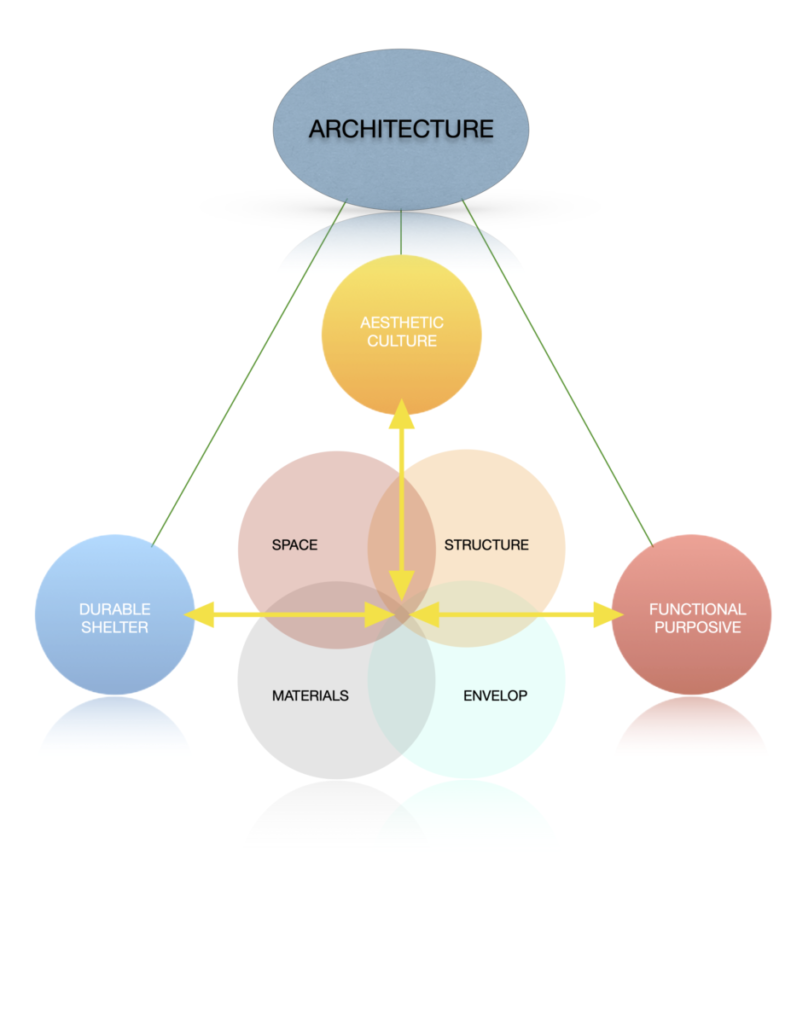
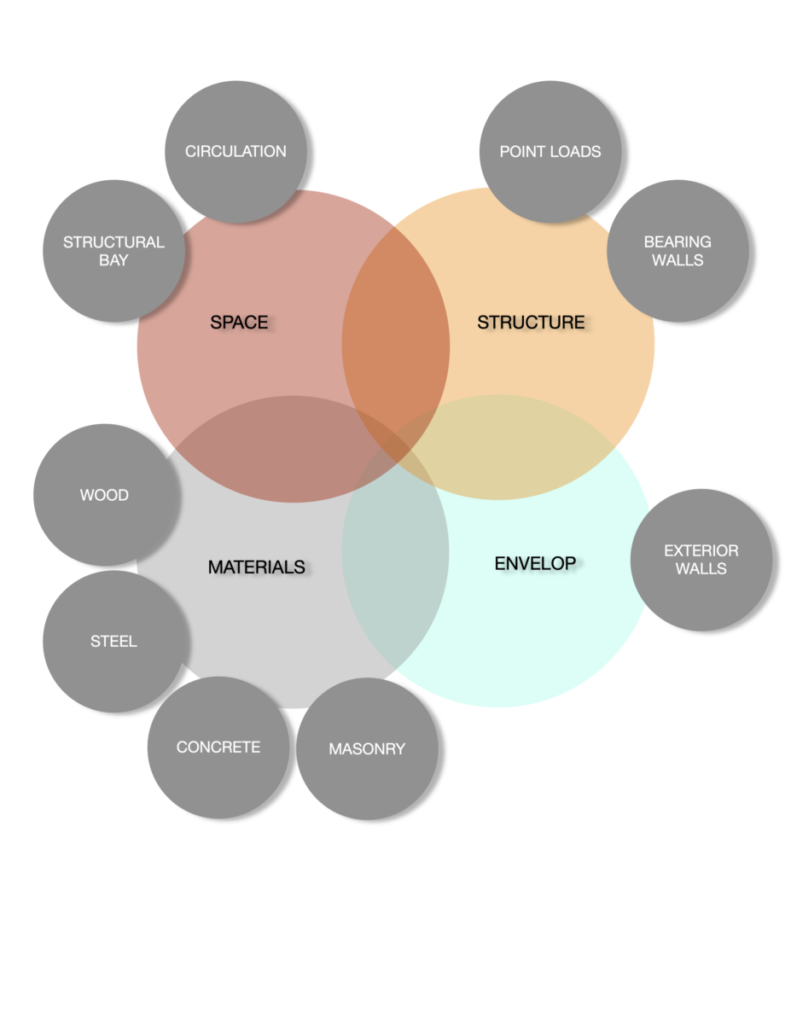
Learning Outcomes
| General Education Learning Outcomes / Assessment Methods | |
| Learning Outcomes | Assessment Methods |
| Upon successful completion of this course the student shall be able to: | To evaluate the students’ achievement of the learning objectives, the professor will do the following: |
| Develop Knowledge from the range of architectural disciplinary concepts presented in the course. | Review student notebooks, observe student participation in class discussions, and review student applications of disciplinary concepts in drawing assignments. |
| Use the texts assigned in the course as well as background knowledge from within the discipline in order to Draw Inferences from the material. | Use a pre and post written exam to assess students’ development and achievement over the course of the semester. |
| Apply Information from the reading within the discipline. | Review student applications of disciplinary concepts in drawing assignments. |
| National Architectural Accrediting Board (NAAB) Students Performance Criteria (SPC) / Assessment Methods | |
| Learning Outcomes | Assessment Methods |
| Upon successful completion of this course the student shall be able to: | To evaluate the students’ achievement of the learning objectives, the professor will do the following: |
| 4. Understand the fundamentals of formal ordering systems and the capacity to inform two- and three- dimensional design. | 4. Review student drawing assignments with implementation of the organizing grid. |
| 5. Understand some of the basic principles used in the appropriate selection of interior and exterior construction materials, finishes, products, components, and assemblies based on their inherent performance, including environmental impact and reuse. | 5. Review student notebooks and drawing assignments with application of material properties, rules of thumb, and performance analysis. |
| Course Specific Learning Outcomes / Assessment Methods | |
| Learning Outcomes | Assessment Methods |
| Upon successful completion of this course the student shall be able to: | To evaluate the students’ achievement of the learning objectives, the professor will do the following: |
| 6. Layout plan drawings by hand and with digital tools. | 6. Review student plan assignments for accuracy and application of line weights and drawing conventions. |
| 7. Understand and apply basic principles of structural characteristics of materials following rules of thumb. | 7. Review student drawing assignments for accurate application of rules of thumb to sizing structural elements for a specific span. |
Teaching/Learning Methods
- This course combines class discussions based on the readings, case study investigations, and technical drawing labs.
- Students are required to maintain a combined notebook/sketchbook for all readings and case study investigations.
- Students will learn to develop rigorous architectural drawings by hard line scaled hand drafting.
Technology + Home Setup Requirements
- Students need access to a device for video conference participation in the course meetings using Zoom.
- Students need to purchase a drawing work surface with parallel or set up a technical drawing desk surface approximately 24″x36″ with either a parallel rule (best option), t-square, or rolling ruler. Use this link to the course coordination site for a full list of required supplies: https://openlab.citytech.cuny.edu/arch1231/supplies/
Submission Formatting Requirements:
Files: All submissions must be in PDF format (not jpeg). All files (drawings, reading notes, sketch assignments) must be named as follows:
Student Lastname_Firstname_ARCH1231_2020_fall_Montgomery_Module# (or reading#)_assignment title_YYYYMMDD.pdf
Sample drawing assignment filename format:
Skywalker_Luke_ARCH1231_201902_Montgomery_Module1_firstfloorplan_20190925.pdf
Sample Reading Notes/Sketches assignment filename format:
Organa_Lea_ARCH1231_201902_Montgomery_Reading6_Building Envelop_20191126.pdf
Reading Notes+Sketches MUST be submitted as a single PDF multipage file for each reading topic in required list.
Any submission not conforming to the above standards will NOT be accepted and must be resubmitted.
Schedule
Topics will be covered in the order below unless otherwise noted during the semester. For more information see the detailed schedule on the Schedule page.
- Module 1 Drawings: Geometry and Order Diagram, Case study floor plan, section, and elevation.
- Module 1 Readings + Notes/Sketches:
- Building Elements + Building Materials
- Stairs and Egress
- Module 2 Drawings: Exterior Wall Details: Plan, Section, Axon
- Module 2 Readings + Notes/Sketches:
- Assemblies and Performance
- Masonry Envelop Assemblies
- Module 3 Drawings: Structural System Study
- Structural Forces and Components
- Structural Systems
Grading Policy
- 30% Module 1 (Drawings + Reading Presentations + Notes/Sketches)
- 40% Module 2 (Drawings + Reading Presentations + Notes/Sketches)
- 25% Module 3 (Drawings + Reading Presentations + Notes/Sketches)
- 5% Participation + Class Reflections
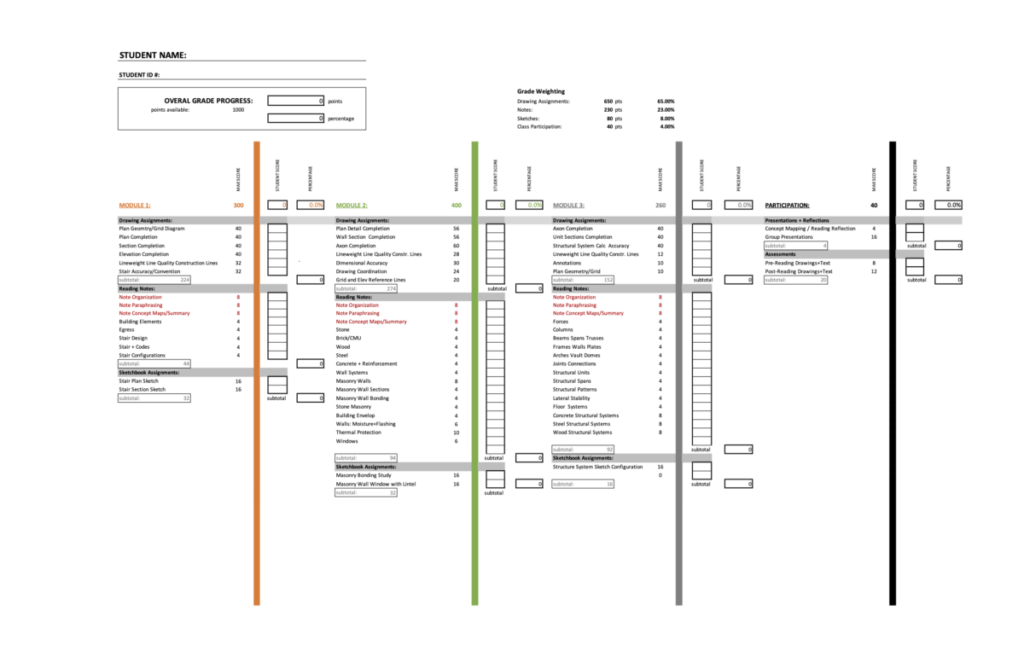
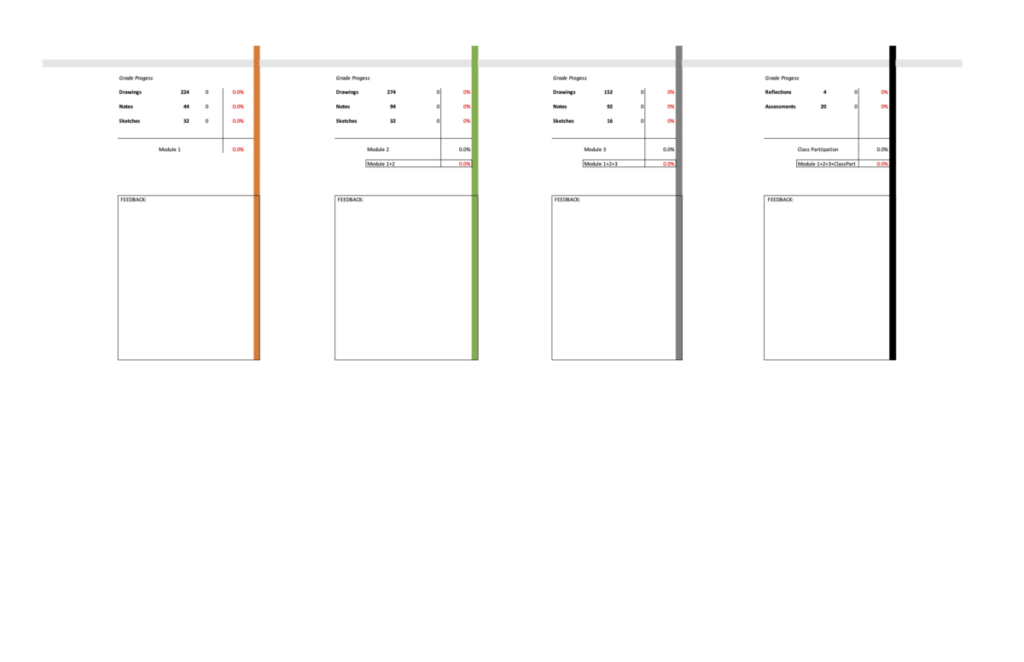
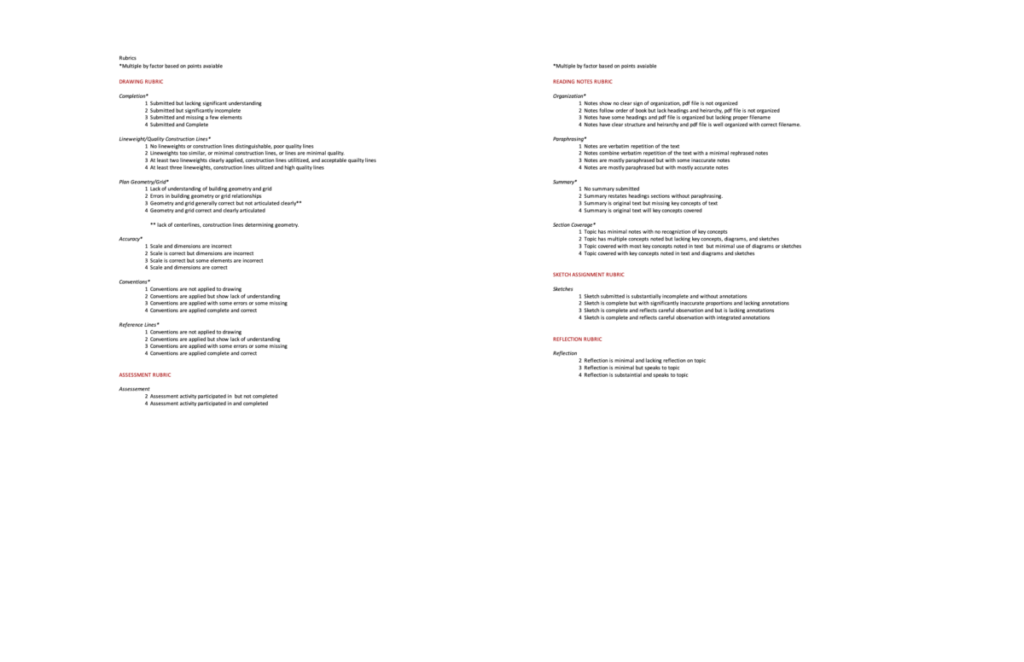
Class Etiquette & Netiquette
All students are expected to attend all class sessions fully. It is preferred, but not required, for all students to have live video turned on during class time. All students are asked to manage their audio such that background noise does not distract from the class discussion or presentation.
Group presentations are a required aspect of this course. All students are expected to communicate fully with their group as required to prepare for all presentations. All students are expected to fully participate in the presentations.
Diversity and Inclusive Education
This course welcomes students from all backgrounds, experiences and perspectives. In accordance with the City Tech and CUNY missions, this course intends to provide an atmosphere of inclusion, respect, and the mutual appreciation of differences so that together we can create an environment in which all students can flourish. It is the instructor’s goal to provide materials and activities that are welcoming and accommodating of diversity in all of its forms, including race, gender identity and presentation, ethnicity, national origin, religion, cultural identity, socioeconomic background, sexuality and sexual orientation, ability, neurodivergence, age, and etc. Your instructor is committed to equity and actively seeks ways to challenge institutional racism, sexism, ableism and other forms of prejudice. Your input is encouraged and appreciated. If a dynamic that you observe or experience in the course concerns you, you may respectfully inform your instructor without fear of how your concerns will affect your grade. Let your instructor know how to improve the effectiveness of the course for you personally, or for other students or student groups. We acknowledge that NYCCT is located on the traditional homelands of the Canarsie and Lenape peoples.
Attendance/Participation
No more than 10% absences are permitted during the semester. For the purposes of record, two late arrivals are considered as one absence. Exceeding this limit will expose the student to failing at the discretion of the instructor due to lack of class participation and mastery of class material.
Academic Integrity Policy
Students and all others who work with information, ideas, texts, images, music, inventions and other intellectual property owe their audience and sources accuracy and honesty in using, crediting and citation of sources. As a community of intellectual and professional workers, the college recognizes its responsibility for providing instruction in information literacy and academic integrity, offering models of good practice, and responding vigilantly and appropriately to infractions of academic integrity. Accordingly, academic dishonesty is prohibited in The City University of New York and is punishable by penalties, including failing grades, suspension and expulsion. More information about the College’s policy on Academic Integrity may be found in the College Catalog.
Course Resources
- Required text: Ching, Francis. Building Construction Illustrated 6th Ed. John Wiley and Sons, 2019.
- Recommended texts: Allen, Edward. Fundamentals of Building Construction: Materials and Methods, 7th Ed. John Wiley & Sons, 2019 + Ching, Francis. Architecture-Form, Space, & Order. John Wiley and Sons, 2007.
- Openlab Course Coordination site: https://openlab.citytech.cuny.edu/arch1231/



